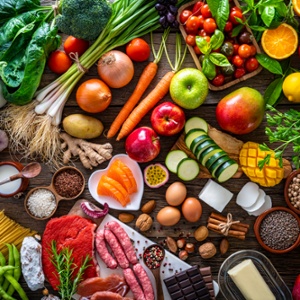Healthier eating means eating a varied and balanced diet, but it's also more important than this. It's about having a positive relationship with food and what food means to you. This includes when, why and how you eat, and your enjoyment of food too.
The Eatwell Guide
The Eatwell Guide shows the types of foods and drinks, and in what proportions, that make up a healthy balanced diet. Eating a variety of foods from the different food groups will give your body the range of nutrients it needs. You can aim to do this over time, such as weekly rather than at every meal.
Eating regularly and not skipping meals is also important, so your body’s hunger and fullness signals work correctly. These signals help you realise when you are hungry or full and when to stop eating, which can help you maintain a healthier weight.
We know food is not just for fuel, and you should be able to enjoy and have a happy relationship with food too. You can use the Eatwell Guide within your routine and in a way that suits your preferences.
If you would find it helpful to have some more information about how to follow the Eatwell Guide recommendations, here is a short video:
Credit: Cardiff and Vale University Health Board
The Eatwell Guide is relevant for most adults. You may need to speak with a health professional for advice if you have special dietary or medical needs.
Other Eatwell Guides
There are other versions of the Eatwell Guide available. One of these versions may show more of the foods you usually eat. The overall messages and recommendations of the Eatwell Guide remain the same. Other versions include:
- African & Caribbean
- South Asian
- Vegetarian
- Vegan
Key Messages
The main messages to take away from the Eatwell Guide are:
-
Try eating at least five portions of a variety of fruit and vegetables daily.
-
Base your meals on potatoes, bread, rice, pasta, chappati, roti, yam, plantain or other starchy carbohydrates; choosing wholegrain versions when possible.
-
Have some dairy or dairy alternatives (such as soya drinks); go for lower fat and lower sugar options when you can.
-
Eat some beans, pulses, chickpeas, daal, fish, eggs, meat-free mince, soya, lean meat, and other proteins.
-
Try to include two portions of sustainable fish every week, one of which should be oily.
-
Choose unsaturated oils and spreads and eat in small amounts.
-
Drink 6-8 cups/glasses of fluid a day. Go for lower sugar options when you can.
-
If eating foods and drinks high in fat, salt, or sugar, try to have these less often and in small amounts.
Look at your weekly food trolley and think about ways to get it closer to the balance recommended in the Eatwell Guide.
Credit






